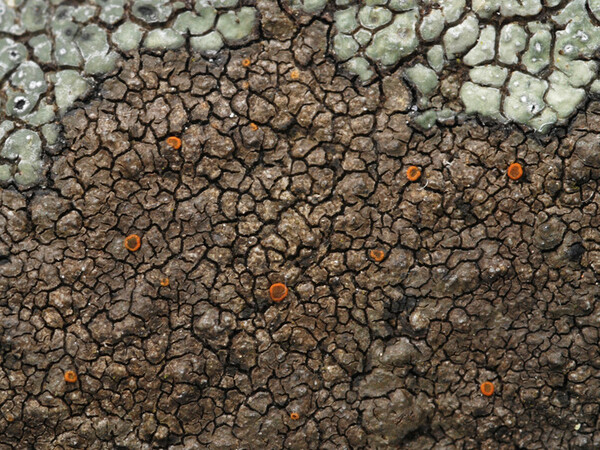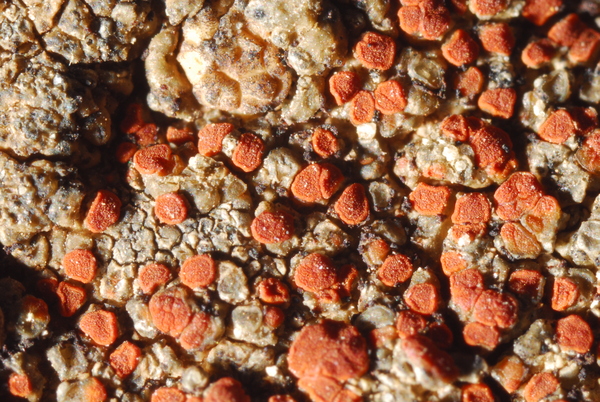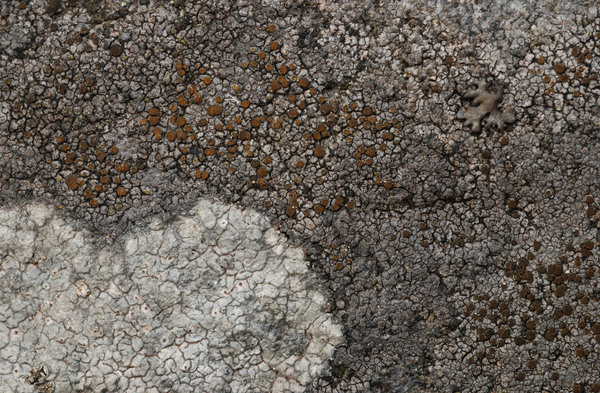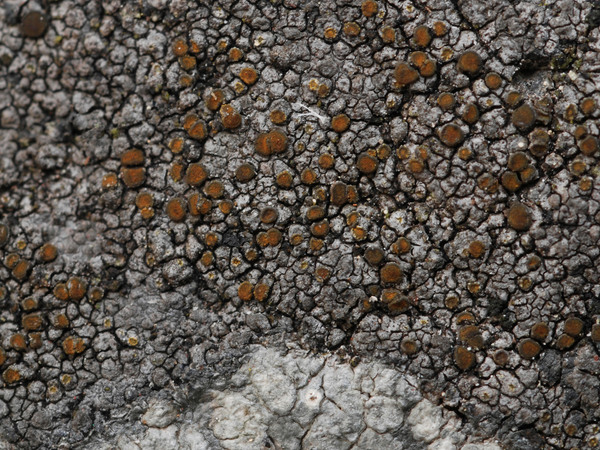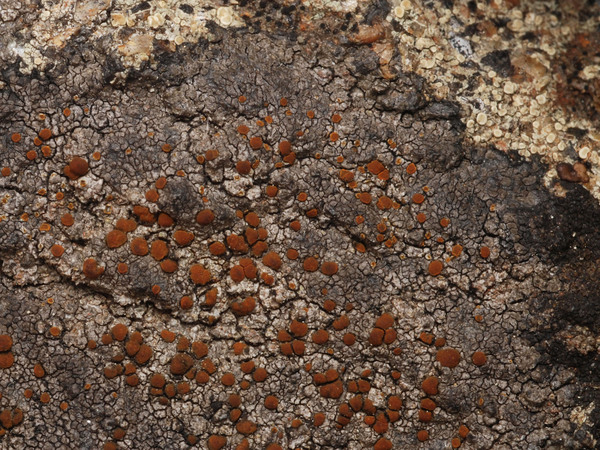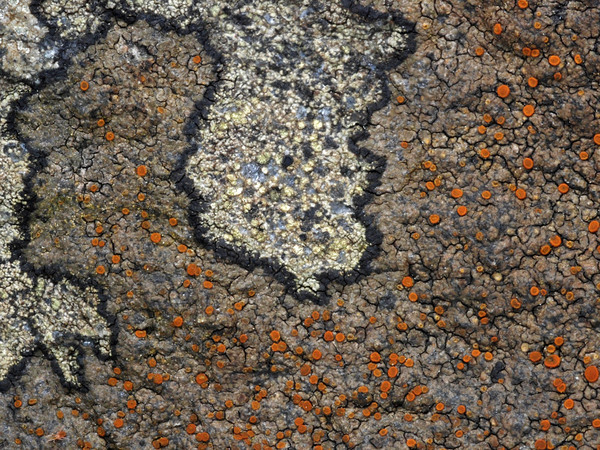Rufoplaca scotoplaca (Nyl.) Arup, Søchting & Frödén
Nord. J. Bot., 31: 74, 2013. Basionym: Lecanora scotoplaca Nyl. - Flora: 232, 1876.
Synonyms: Biatora caesiorufa auct. p.p. non (Wibel) Fr.; Caloplaca caesiorufa auct. p.p. non (Wibel) Flagey; Caloplaca scotoplaca (Nyl.) H. Magn.
Description: Thallus crustose, episubstratic, thin, continuous to rimose-areolate, ash-grey to dark grey-brown, the areoles 0.2-0.4 mm wide, 0.1-0.2 mm thick, irregular, flat to uneven, separated by very thin, often indistinct cracks. Apothecia adpressed to sessile, circular to angular by mutual compression, 0.2-0.4(-0.5) mm across, with a flat to slightly convex, bright to dark rust-red, finally rarely blackening disc, a thin, mostly persistent, at first paler, then concolorous (or blackened), rarely excluded proper margin, and a grey thalline margin which is evident at least in young apothecia. Proper exciple brownish yellow in outer part, colourless within; epithecium brownish yellow, inspersed with orange-yellow crystals of anthraquinones reacting K+ purple-red; hymenium colourless or yellowish in upper part, 60-70 μm high, amyloid; paraphyses simple or sparingly branched in upper part, c. 1.7 μm thick at base, the apical cells swollen, 4-5 μm wide; hypothecium 20-50 μm high, colourless to greyish, I+ dark blue. Asci 8-spored, clavate, functionally unitunicate, apically thickened with a broad internal beak, the inner part of apex and external cap I+ blue, Teloschistes-type. Ascospores 2-celled, polarilocular, hyaline, narrowly ellipsoid, 10-13 x (3-)4-6(-8) μm, the equatorial thickening (“septum”) (2-)3-4(-5) μm, 1/4-1/3 of spore length. Photobiont chlorococcoid. Spot tests: thallus K- or K+ weakly violet in section, C- or C+ violet (reaction visible only in sections) KC-, P-; disc of apothecia K+ purple-red, C-. Chemistry: thallus with the Sedifolia-grey pigment; disc of apothecia with non-chlorinated anthraquinones.
Growth form: Crustose
Substrata: rocks
Photobiont: green algae other than Trentepohlia
Reproductive strategy: mainly sexual
Poorly known taxon in need of further study
Commonnes-rarity: (info)
Alpine belt: absent
Subalpine belt: absent
Montane belt: very rare
Dry submediterranean belt: absent
Humid submediterranean belt: extremely rare
Padanian area: absent
pH of the substrata:
1 2 3 4 5
Solar irradiation:
1 2 3 4 5
Aridity:
1 2 3 4 5
Eutrophication:
1 2 3 4 5
Poleotolerance:
0 1 2 3
Altitudinal distribution:
1 2 3 4 5 6
Rarity
absent
extremely rare
very rare
rare
rather rare
rather common
common
very common
extremely common
Loading data...
Occurrence data
Predictive map
Growth form: Crustose
Substrata: rocks
Photobiont: green algae other than Trentepohlia
Reproductive strategy: mainly sexual
Poorly known taxon in need of further study
Commonnes-rarity: (info)
Alpine belt: absent
Subalpine belt: absent
Montane belt: very rare
Dry submediterranean belt: absent
Humid submediterranean belt: extremely rare
Padanian area: absent
pH of the substrata:
| 1 | 2 | 3 | 4 | 5 |
Solar irradiation:
| 1 | 2 | 3 | 4 | 5 |
Aridity:
| 1 | 2 | 3 | 4 | 5 |
Eutrophication:
| 1 | 2 | 3 | 4 | 5 |
Poleotolerance:
| 0 | 1 | 2 | 3 |
Altitudinal distribution:
| 1 | 2 | 3 | 4 | 5 | 6 |
Rarity
absent
extremely rare
very rare
rare
rather rare
rather common
common
very common
extremely common
Loading data...
Occurrence data
Predictive map


